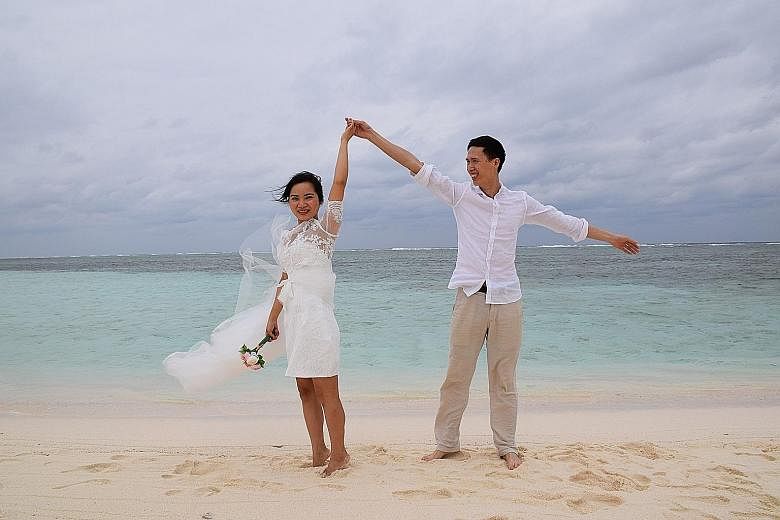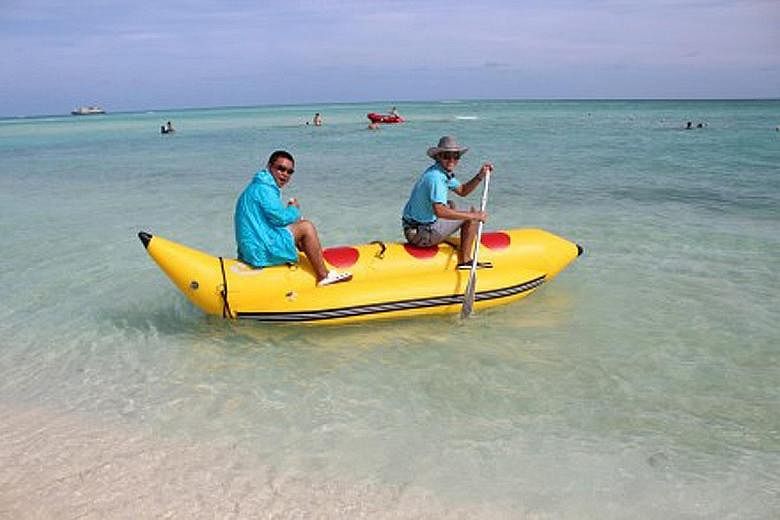As Ms Li Qingqing stood singing China's national anthem on Quanfu island, tears started welling in her eyes.
She had set foot there last month as a tourist on one of the smallest islands in the disputed Paracels, which China won control over in 1974 after a battle with Vietnam.
A guide related to her group how Vietnamese personnel once came to Quanfu island, where a permanent flagpost has been built, to lower the Chinese flag and raise a Vietnamese one in its place.
"It's hard not to feel emotional, seeing the Chinese flag raised and thinking of the struggles gone through to safeguard this land," Ms Li, 30, told The Straits Times.
She had been planning to join the tour for months to take wedding photos with husband Li Weixiang, 32, who similarly found himself "swept up by patriotic feelings" during the flag-raising ceremony.
Indeed, weaned on accounts in school textbooks, the Paracels - which the Chinese call Xisha - clearly hold an important place in the hearts of the Chinese tourists who visit them.
Many of the tourists who spoke to The Straits Times after disembarking from a cruise ship in Hainan's southern beach resort Sanya last week described a curiosity to visit a place they have only heard about growing up.
Some also remember the theme song, Xisha, My Lovely Home, from the 1976 Chinese film, The Story Of The South China Sea, which depicts the battle with Vietnam.
"Seeing the southernmost point of our zu guo (motherland) is a key motivation," said retiree Qiu Yu, 59, echoing the sentiments of others.
About 17,000 tourists have joined the four-day cruise since the government began running them in 2013, as part of moves to strengthen China's territorial claims on the South China Sea.
While the tourists are aware of the ongoing disputes with other countries, there is little doubt in their mind that the Paracels belong to China, given its longstanding control of the archipelago.
"The Xisha islands are an important part of China's history," said retiree Long Lv, 55, who was travelling with a group of friends from Guangdong. "We feel very honoured to be part of this tour."
Haikou-based tour agency manager Zhang Shiliang, who has been selling the Xisha tours since its inception, said passengers come from all over China. "Most who sign up are sentimental towards Xisha," he told The Straits Times.
He said this is why they are willing to pay higher prices for the cruise, where the cheapest bed in a 16-room cabin goes for 2,880 yuan (S$600) and a bed in a private room costs about 5,000 yuan.
In comparison, 3,000 yuan can buy a Chinese tourist a six-day trip to Phuket. As such, the demographic of the Xisha tourist skews towards older people who are more comfortable on cruises, have greater spending power and may have stronger feelings about Xisha, having lived through the battle for it, said Mr Zhang.
"We get many inquiries from older customers, but have to turn them away," he said. "For safety reasons, the cruise doesn't take people above 65 years old."
The cruise ship, Star Of The Beibu Gulf, departs weekly from Sanya. Along the way, it stops near three islands - Yagong, Quanfu and Yinyu - which passengers can visit using smaller speedboats.
They can walk or snorkel on the islands, which have minimal facilities. Each person is given a trash bag to keep their rubbish.
"Nature is the main reason I came," said Beijing resident Sun Jie, 55, who signed up for the tour with his wife and daughter. "This could be the last unspoilt part of China."
Another tourist who only wanted to be known as Ms Chen, 45, said that she and her companions became seasick on the journey.
"But the moment we arrived and saw how pristine the islands are, I felt this was all worth it," she said.
Despite the steady demand and stream of tourists, the authorities are clearly still cautious of sensitivities and security. A passenger on their tour who brought a drone camera to take aerial photographs was quickly stopped, Mr Li recounted.
Only mainland Chinese are allowed on the Paracels cruise and all passengers have to be vetted.
A small number of tourists have been rejected before, for reasons known only to the authorities, said Mr Zhang.
"As a part of our total tourism business, the current numbers for Xisha tourists is negligible," he added. "If accommodation can be built on the island, perhaps it can grow more as a destination in the coming years."
Chinese media reports last year said that the authorities were planning a second cruise link to the Paracels, but there have been no further developments so far.
The tour, however, has already fulfilled the dream of Ms Zhang Lihan, 50. She believes she is doing her part in "standing up to other countries" which want to claim the Paracels.
"I can't take up arms, but I can visit. We shouldn't be bullied by smaller countries," she said. "There are many islands all over the world, but there is only one Xisha."
For more stories on Asia's territorial disputes, go to http:// str.sg/Zv2q




